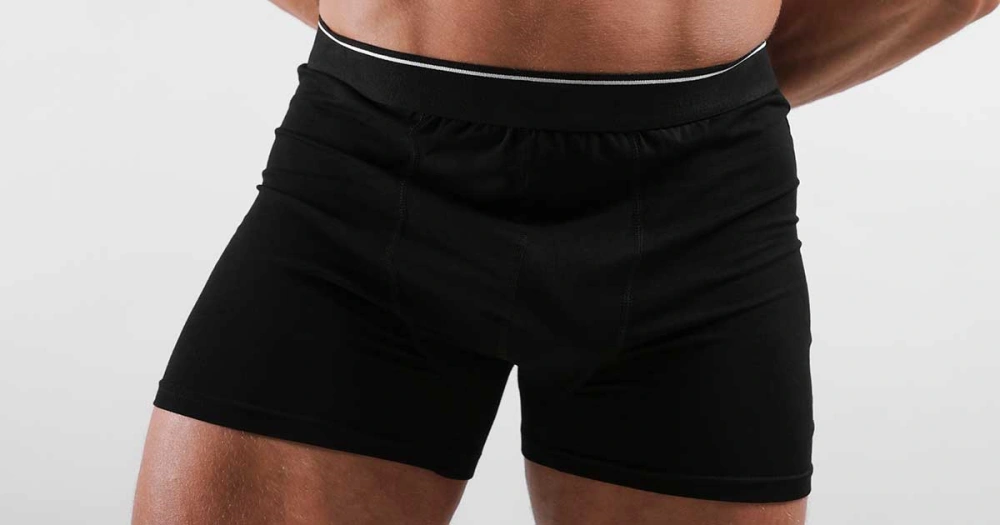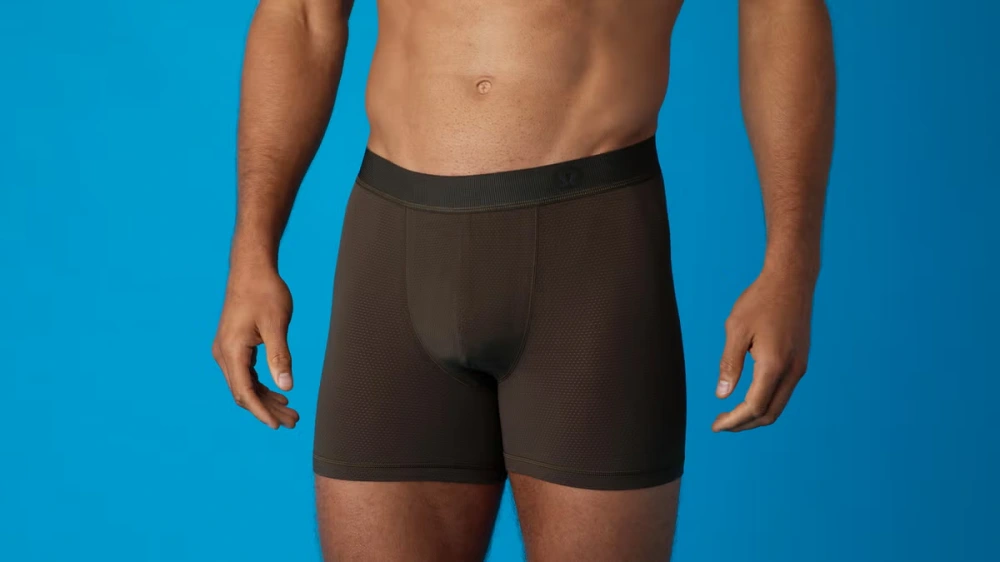You might wonder, does polyester underwear lower testosterone? This question pops up often, especially when you care about your hormonal health. Polyester underwear is popular in activewear and everyday use because it’s durable and quick-drying.
Many brands and people choose polyester blends for their underwear, thanks to the rise of athleisure. While cotton remains a favorite, polyester underwear offers functional benefits. When you look for comfortable underwear, it’s smart to think about both science and how the fabric feels.
Key Takeaways
Polyester underwear does not lower testosterone according to current research, but it may affect sperm health due to heat and electrostatic effects.
Choosing loose, breathable underwear made from natural fabrics like cotton or bamboo helps keep the testicles cool and supports reproductive health.
Moisture-wicking polyester underwear can keep you dry and comfortable, especially during active days or in warm climates.
Tight or heat-trapping underwear can raise scrotal temperature, which may harm sperm quality but does not directly reduce testosterone levels.
Comfort and fit matter most; pick underwear that feels good, fits well, and suits your lifestyle to support overall hormonal health.
Does Polyester Underwear Lower Testosterone?
Scientific Evidence
You probably want to know if polyester underwear can lower testosterone. This question has sparked a lot of curiosity, especially since you see so many different fabrics on the market. Let’s look at what scientists have found so far.
Researchers have run several studies on both animals and humans to figure out if polyester underwear affects testosterone levels. Here’s a quick look at how these studies compare:
Study Type | Subjects | Intervention | Key Findings | Mechanism Proposed | Testosterone Measurement |
|---|---|---|---|---|---|
Animal Studies | Rats, Dogs | Wearing polyester or polyester-blend underwear/pants | Reduced sexual activity, sperm count, motility; degenerative testicular changes; electrostatic charges detected | Electrostatic fields and thermoregulation disruption | Yes (dogs) |
Human Studies | Men (small groups) | Wearing 100% polyester underwear or polyester slings | Decreased sexual activity, azoospermia reversible after stopping; electrostatic charges measured | Electrostatic fields and thermoregulation disruption | Yes |
Human Studies | 656 men (large study) | Underwear style (boxers vs. tighter briefs), fabric not specified | Looser underwear linked to higher sperm concentration and lower FSH; no significant testosterone differences; no direct electrostatic measurement | Likely scrotal temperature effects, no direct polyester effect studied | No |
If you look at animal studies, rats wearing polyester pants showed less sexual activity and lower sperm counts compared to those wearing cotton or wool. Scientists measured electrostatic charges only in the polyester groups. When the rats stopped wearing polyester, their sexual activity returned to normal. Researchers think the electrostatic fields from polyester fabric might play a role.
In small human studies, men who wore 100% polyester underwear or polyester slings had decreased sexual activity. Electrostatic charges were measured, and some men developed azoospermia (no sperm), but this reversed after they stopped wearing polyester.
These studies did measure testosterone, but the results were not consistent or strong enough to prove a direct link.
A larger study with 656 men looked at underwear style, not fabric. Men who wore looser underwear like boxers had higher sperm counts and lower FSH (a hormone related to sperm production), but their testosterone levels did not change much.
The study did not focus on polyester underwear, so you can’t say polyester was the cause.
Note: Most experts agree that polyester underwear may affect sperm health, but there’s no solid proof that it can lower testosterone. The main concern is about sperm count and motility, not testosterone levels.

Research on Testosterone Levels
You might still wonder, does polyester underwear lower testosterone? Endocrinologists and reproductive health experts have looked at this question closely.
They agree that polyester and other synthetic fabrics can affect sperm parameters, like count and motility, but they do not significantly influence testosterone levels.
Here’s what you should know:
Polyester underwear can create electrostatic fields and may raise scrotal temperature, but these changes are small.
Most studies show that underwear style (boxers vs briefs) matters more for sperm health than the actual fabric.
Experts recommend natural fibers like cotton, bamboo, or modal for better breathability, but they do not say polyester underwear will lower testosterone.
Comfort and practicality matter most when you choose underwear. You should pick what feels best for you.
If you’re worried about hormonal health, you don’t need to avoid polyester underwear just because of testosterone. The evidence does not show a direct link between polyester underwear and lower testosterone levels. You can focus on finding underwear that fits well and keeps you comfortable.
🧑⚕️ Tip: If you want to support sperm health, choose looser-fitting underwear and breathable fabrics. For testosterone, there’s no need to stress about polyester.
So, does polyester underwear lower testosterone? Based on current research, the answer is no. You can wear polyester underwear without worrying about your testosterone levels. The real impact is on comfort and sperm quality, not hormones.
Polyester Underwear and Hormonal Health

Heat Retention Effects
When you pick underwear, you probably want something that feels good and keeps you comfortable all day. Polyester underwear is popular because it’s durable and dries quickly. However, you should know how it handles heat and moisture.
Synthetic fabrics like polyester tend to trap heat and moisture more than natural fibers. This can make you feel sweaty or uncomfortable, especially if you wear tight underwear or live in a warm climate.
Here’s what studies have found about heat retention and underwear fabrics:
Polyester underwear can increase heat retention, which may affect sperm production and hormonal health.
Elevated scrotal temperature is linked to reproductive health concerns, but there’s no conclusive proof that polyester alone lowers testosterone.
Natural, breathable fabrics like cotton or bamboo help regulate body temperature and reduce heat buildup.
High-quality underwear made from moisture-wicking materials offers better comfort and temperature control.
Switching to breathable fabrics can help you avoid heat-related discomfort and support hormonal health.
You might notice that polyester has low absorbency. Sweat can stay close to your skin, creating a humid environment. This can lead to discomfort and even increase the risk of skin irritation or infection. If you want to keep cool and dry, look for underwear with advanced moisture-wicking technology.
Impact on Testicular Health
Your testicular health depends on keeping the right temperature. Studies show that when scrotal temperature rises, sperm production can drop. Polyester underwear, especially if it fits tightly, can raise this temperature. Here’s a quick look at how different fabrics compare:
Fabric Type | Effect on Scrotal Temperature | Potential Impact on Hormonal Balance |
|---|---|---|
Polyester | Traps heat, raises temperature | May indirectly disrupt testosterone production |
Cotton | Breathable but retains moisture | Less heat retention, moderate impact |
Micro Modal Air | Lightweight, moisture-wicking | Supports temperature regulation, positive effect |
Bamboo Blends | Eco-friendly, temperature-regulating | Supports hormonal health |
Silk | Soft but less moisture-wicking | Less effective at temperature control |
Medical research says that testosterone production works best when your testes stay cooler than the rest of your body. If you wear underwear that traps heat, you might risk disrupting this balance.
While no study proves polyester underwear directly lowers testosterone, keeping things cool and comfortable supports both sperm quality and hormonal health.
Friendtex Polyester Underwear Features

Moisture-Wicking and Breathability
When you choose underwear, you want to stay cool and dry all day. Friendtex polyester underwear makes this easy. The fabric is designed with your comfort in mind, especially if you have an active lifestyle or live in a warm place. Here’s what sets it apart:
Lightweight construction keeps you from feeling weighed down.
Moisture-wicking technology pulls sweat away from your skin, so you stay dry.
Breathable fabric lets air flow, which helps reduce heat and keeps you comfortable.
Quick-drying material means you never have to worry about dampness after a workout or a busy day.
You’ll notice these features are similar to what you find in top sportswear. If you want underwear that works as hard as you do, polyester underwear from Friendtex is a smart choice. You can go from the gym to the office without feeling sticky or overheated.
💡 Tip: If you often feel hot or sweaty, try switching to moisture-wicking polyester underwear for better temperature control.
Comfort and Durability
You want underwear that feels good and lasts a long time. Friendtex polyester underwear stands out for its comfort and toughness. The fabric holds its shape, even after many washes. You don’t have to worry about stretching, shrinking, or fading. This underwear keeps looking and feeling new, even if you wear it every day.
Compared to other materials, polyester underwear is much more durable. It resists wear and tear, making it perfect for active days or frequent washing.
Blends with spandex add extra stretch, so you get a snug fit without losing comfort. Many customers say Friendtex underwear feels soft and supportive, with no sagging or bunching.
If you want underwear that combines comfort, style, and long-lasting quality, Friendtex polyester underwear delivers on all fronts.
Comparing Underwear Fabrics
Cotton vs Polyester Underwear
When you shop for underwear, you probably notice cotton and polyester are everywhere. Cotton feels soft and lets your skin breathe. It’s a natural fiber, so it’s gentle and great for sensitive skin.
Many people love cotton because it absorbs moisture and helps keep you cool. But here’s the catch—cotton holds onto sweat, so it can feel damp and take longer to dry, especially if the fabric is thick.
Polyester, on the other hand, is a synthetic fiber. It’s known for drying quickly and wicking moisture away from your skin.
Textile research shows micro-denier polyester fabrics have higher water vapor permeability and lower resistance, which means sweat evaporates faster and you stay drier. Polyester underwear is also durable and keeps its shape after many washes.
Tip: If you want underwear that dries fast after a workout, polyester might be your pick. If you have sensitive skin or want all-day softness, cotton is a classic choice.
Here’s a quick comparison:
Feature | Cotton | Polyester |
|---|---|---|
Breathability | High | Moderate to high (micro-denier) |
Moisture Wicking | Absorbs, dries slowly | Wicks, dries quickly |
Comfort | Soft, hypoallergenic | Smooth, durable |
Skin Health | Great for sensitive skin | May irritate some |
Price | Usually lower | Mid-range |
Microfiber and Nylon Options
You might see microfiber and nylon underwear on the shelves, too. Microfiber feels silky and smooth. It’s made from super-fine synthetic fibers, usually polyester or nylon blends.
This fabric excels at wicking moisture and dries quickly, which is perfect if you’re active or live in a hot climate. Nylon is lightweight and stretchy, giving you a snug fit.
But here’s something to keep in mind. Studies show that synthetic fabrics like microfiber and nylon don’t breathe as well as cotton. They can trap heat and moisture, which sometimes leads to skin irritation or infections, especially if you wear them all day.
One study found that cotton underwear reduced yeast infections and skin irritation compared to synthetics. If you have sensitive skin or get infections easily, cotton might be a safer bet.
Fabric | Breathability | Moisture Management | Comfort/Notes |
|---|---|---|---|
Cotton | High | Excellent absorbency | Soft, hypoallergenic, gentle on skin |
Nylon | Low | Poor absorbency | Retains odors, less comfy in heat |
Polyester | Moderate | Excellent wicking | Durable, smooth, good for sports |
Spandex Underwear for Women
If you want underwear that moves with you, spandex is a game-changer. Spandex stretches and snaps back, so your underwear fits snugly and stays put. Many brands blend spandex with cotton or polyester for extra comfort and flexibility. This is great for active days or when you want a smooth look under clothes.
A study hasn’t directly linked spandex underwear to hormonal changes or skin problems, but experts say synthetic fabrics can trap moisture and heat.
This can sometimes cause irritation or infections, especially if you sweat a lot. Spandex is best for short-term wear or workouts. For everyday comfort, you might prefer blends with more cotton.
Remember: If you have sensitive skin or want to avoid irritation, look for underwear with a higher percentage of natural fibers.
Choosing Underwear for Healthy Testosterone
Tips for Fabric Selection
Picking the right underwear can make a big difference for your comfort and hormonal health. You want to keep things cool and dry, especially if you care about testosterone.
Medical experts say that underwear fit matters just as much as fabric. Tight or heat-trapping underwear can raise scrotal temperature, which may disrupt hormone levels and testosterone production. Looser, breathable styles help keep your body at the right temperature.
Here are some quick tips for choosing testosterone-friendly underwear:
Go for breathable fabrics: Cotton, bamboo, and modal let air flow and help regulate temperature.
Check the fit: Avoid underwear that feels too tight or restrictive. Look for designs with pouch support to prevent compression.
Look for moisture-wicking options: If you prefer synthetic fabrics, pick ones with moisture control to keep sweat away from your skin.
Watch for skin reactions: If you notice irritation or rashes, try switching to natural fibers.
Rotate your styles: Mix in looser underwear like boxers to give your body a break from snug fits.
Fabric Type | Breathability | Moisture Control | Comfort Level |
|---|---|---|---|
Cotton | High | Moderate | Soft |
Polyester | Moderate | High | Durable |
Bamboo | High | High | Very Soft |
Microfiber | Moderate | High | Smooth |
🩲 Tip: The best testosterone-friendly underwear keeps you cool, dry, and comfortable all day.
Lifestyle and Comfort
Your daily habits play a big role in supporting healthy testosterone. Underwear is just one piece of the puzzle. When you combine smart fabric choices with good lifestyle habits, you set yourself up for better hormonal health.
Loose, breathable underwear helps regulate temperature and supports sperm health.
Good hygiene and gentle care products keep your skin healthy and reduce irritation.
Regular exercise and a balanced diet boost reproductive health and hormone levels.
Managing stress helps keep testosterone steady.
Staying hydrated and eating foods rich in zinc and antioxidants support overall wellness.
Many people complain about polyester underwear trapping heat and moisture, which can cause discomfort, skin irritation, and even odor. If you notice these issues, try switching to natural fibers or advanced moisture-wicking fabrics. Comfort matters—when you feel good, your body works better.
Remember, the right underwear and healthy habits work together to support your hormone levels and overall well-being.
Conclusion
You don’t need to worry about polyester directly lowering testosterone. Studies show no clear link, but heat retention from some fabrics can affect your comfort and well-being. If you want to support hormonal health, try these tips:
Pick breathable fabrics like cotton, bamboo, or Micro Modal Air.
Avoid tight fits and change your underwear daily.
Choose moisture-wicking options for better temperature control.
Focus on comfort and science when you pick what to wear each day.
FAQ
Does polyester underwear lower testosterone?
You don’t need to worry. Current research shows no direct link between polyester underwear and lower testosterone. Most studies focus on sperm health, not hormone levels. You can wear polyester underwear without stressing about your testosterone.
Is polyester underwear safe for daily wear?
Yes, you can wear polyester underwear every day. High-quality polyester, especially with moisture-wicking features, keeps you comfortable and dry. If you notice irritation, try switching styles or fabrics.
Can polyester underwear cause infertility?
There’s no strong evidence that polyester underwear causes infertility. Some studies suggest heat and tight fits may affect sperm quality. Choose breathable, looser styles if you want to support reproductive health.
How do I choose the best underwear fabric for hormonal health?
Pick breathable fabrics like cotton, bamboo, or modal. Look for moisture-wicking options if you prefer synthetics. Looser fits help keep things cool. Comfort should always guide your choice.
What makes Friendtex polyester underwear different?
Friendtex polyester underwear stands out for its moisture-wicking, breathable design, and long-lasting comfort. You get a lightweight fit that keeps you dry all day. Customization options let you find the perfect style for your needs.


